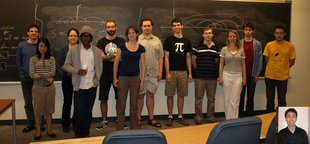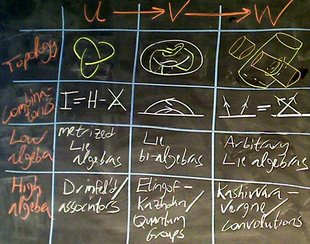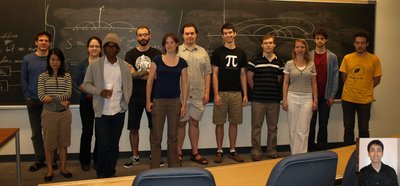AKT-09/HW2: Difference between revisions
No edit summary |
No edit summary |
||
| (2 intermediate revisions by the same user not shown) | |||
| Line 1: | Line 1: | ||
{{AKT-09/Navigation}} |
{{AKT-09/Navigation}} |
||
{{In Preparation}} |
|||
'''Solve the following problems''' and submit them in class by |
'''Solve the following problems''' and submit them in class by November 3, 2009: |
||
'''Problem 1.''' Let <math>{\mathfrak g}_1</math> and <math>{\mathfrak g}_2</math> be finite dimensional metrized Lie algebras, let <math>{\mathfrak g}_1\oplus{\mathfrak g}_2</math> denote their direct sum with the obvious "orthogonal" bracket and metric, and let <math>m</math> be the canonical isomorphism <math>m:{\mathcal U}({\mathfrak g}_1)\otimes{\mathcal U}({\mathfrak g}_2)\to{\mathcal U}({\mathfrak g}_1\oplus{\mathfrak g}_2)</math>. Prove that |
|||
| ⚫ | |||
{{Equation*|<math>{\mathcal T}_{{\mathfrak g}_1\oplus{\mathfrak g}_2} = m\circ({\mathcal T}_{{\mathfrak g}_1}\otimes{\mathcal T}_{{\mathfrak g}_2})\circ\Box</math>,}} |
|||
where <math>\Box:{\mathcal A}(\uparrow)\to{\mathcal A}(\uparrow)\otimes{\mathcal A}(\uparrow)</math> is the co-product and <math>{\mathcal T}_{{\mathfrak g}}</math> denotes the <math>{\mathcal U}({\mathfrak g})</math>-valued "tensor map" on <math>{\mathcal A}</math>. Can you relate this with the first problem of [[AKT-09/HW1|HW1]]? |
|||
| ⚫ | |||
# Find a concise algorithm to compute the weight system <math>W_{so}</math> associated with the Lie algebra <math>so(N)</math> in its defining representation. |
# Find a concise algorithm to compute the weight system <math>W_{so}</math> associated with the Lie algebra <math>so(N)</math> in its defining representation. |
||
# Verify that your algorithm indeed satisfies the <math>4T</math> relation. |
# Verify that your algorithm indeed satisfies the <math>4T</math> relation. |
||
'''Problem |
'''Problem 3.''' The ''Kauffman polynomial'' <math>F(K)(a,z)</math> (see {{ref|Kauffman}}) of a knot or link <math>K</math> is <math>a^{-w(K)}L(K)</math> where <math>w(L)</math> is the writhe of <math>K</math> and where <math>L(K)</math> is the regular isotopy invariant defined by the skein relations |
||
{{Equation*|<math>L(s_\pm)=a^{\pm 1}L(s))</math>}} |
{{Equation*|<math>L(s_\pm)=a^{\pm 1}L(s))</math>}} |
||
| Line 17: | Line 20: | ||
and by the initial condition <math>L(\bigcirc)=1</math>. State and prove the relationship between <math>F</math> and <math>W_{so}</math>. |
and by the initial condition <math>L(\bigcirc)=1</math>. State and prove the relationship between <math>F</math> and <math>W_{so}</math>. |
||
'''Problem 3.''' |
|||
'''Mandatory but unenforced.''' Find yourself in the class photo and identify yourself as explained in the [[AKT-09/Class Photo|photo page]]. |
'''Mandatory but unenforced.''' Find yourself in the class photo and identify yourself as explained in the [[AKT-09/Class Photo|photo page]]. |
||
Latest revision as of 18:17, 28 October 2009
| ||||||||||||||||||||||||||||||||||||||||||||||||||||||
Solve the following problems and submit them in class by November 3, 2009:
Problem 1. Let [math]\displaystyle{ {\mathfrak g}_1 }[/math] and [math]\displaystyle{ {\mathfrak g}_2 }[/math] be finite dimensional metrized Lie algebras, let [math]\displaystyle{ {\mathfrak g}_1\oplus{\mathfrak g}_2 }[/math] denote their direct sum with the obvious "orthogonal" bracket and metric, and let [math]\displaystyle{ m }[/math] be the canonical isomorphism [math]\displaystyle{ m:{\mathcal U}({\mathfrak g}_1)\otimes{\mathcal U}({\mathfrak g}_2)\to{\mathcal U}({\mathfrak g}_1\oplus{\mathfrak g}_2) }[/math]. Prove that
where [math]\displaystyle{ \Box:{\mathcal A}(\uparrow)\to{\mathcal A}(\uparrow)\otimes{\mathcal A}(\uparrow) }[/math] is the co-product and [math]\displaystyle{ {\mathcal T}_{{\mathfrak g}} }[/math] denotes the [math]\displaystyle{ {\mathcal U}({\mathfrak g}) }[/math]-valued "tensor map" on [math]\displaystyle{ {\mathcal A} }[/math]. Can you relate this with the first problem of HW1?
Problem 2.
- Find a concise algorithm to compute the weight system [math]\displaystyle{ W_{so} }[/math] associated with the Lie algebra [math]\displaystyle{ so(N) }[/math] in its defining representation.
- Verify that your algorithm indeed satisfies the [math]\displaystyle{ 4T }[/math] relation.
Problem 3. The Kauffman polynomial [math]\displaystyle{ F(K)(a,z) }[/math] (see [Kauffman]) of a knot or link [math]\displaystyle{ K }[/math] is [math]\displaystyle{ a^{-w(K)}L(K) }[/math] where [math]\displaystyle{ w(L) }[/math] is the writhe of [math]\displaystyle{ K }[/math] and where [math]\displaystyle{ L(K) }[/math] is the regular isotopy invariant defined by the skein relations
(here [math]\displaystyle{ s }[/math] is a strand and [math]\displaystyle{ s_\pm }[/math] is the same strand with a [math]\displaystyle{ \pm }[/math] kink added) and
and by the initial condition [math]\displaystyle{ L(\bigcirc)=1 }[/math]. State and prove the relationship between [math]\displaystyle{ F }[/math] and [math]\displaystyle{ W_{so} }[/math].
Mandatory but unenforced. Find yourself in the class photo and identify yourself as explained in the photo page.
[Kauffman] ^ L. H. Kauffman, An invariant of regular isotopy, Trans. Amer. Math. Soc. 312 (1990) 417-471.


